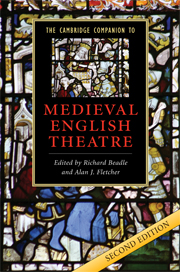Book contents
- Frontmatter
- 1 An introduction to medieval English theatre
- 2 The theatricality of medieval English plays
- 3 The cultural work of early drama
- 4 The York Corpus Christi Play
- 5 The Chester cycle
- 6 The Towneley pageants
- 7 The N-Town plays
- 8 The non-cycle plays and the East Anglian tradition
- 9 Morality plays
- 10 Saints and miracles
- 11 Modern productions of medieval English drama
- 12 A guide to criticism of medieval English theatre
- Select bibliography
- Author index to the bibliography
- General index
12 - A guide to criticism of medieval English theatre
Published online by Cambridge University Press: 28 November 2011
- Frontmatter
- 1 An introduction to medieval English theatre
- 2 The theatricality of medieval English plays
- 3 The cultural work of early drama
- 4 The York Corpus Christi Play
- 5 The Chester cycle
- 6 The Towneley pageants
- 7 The N-Town plays
- 8 The non-cycle plays and the East Anglian tradition
- 9 Morality plays
- 10 Saints and miracles
- 11 Modern productions of medieval English drama
- 12 A guide to criticism of medieval English theatre
- Select bibliography
- Author index to the bibliography
- General index
Summary
Critical approaches
Nineteenth- and twentieth-century outlines
The English drama that preceded Shakespeare was held in such disrepute for four centuries that it became necessary for the twentieth to invent the concept ‘medieval drama’. Both words show the needs and aspirations of the time, the adjective reflecting a concept of medieval society which need not be either romanticised or patronised, and the noun embodying the profound experiences of the twentieth-century theatre. The latter was influential in both the performing of the early plays and the redefinition of drama.
The invention of the term ‘medieval drama’ cannot be attributed to one person, but it is the business of the first part of this guide to consider a number of authors whose work forced a revaluation of the plays and made them seem, as they now do, one of the riches of English culture in spite of their rather chancy survival. The second part deals with a number of special topics indispensable to the study of the plays, and embracing in differing ways the changing corpus of ideas which forms the basis of our understanding and appreciation of the early plays. There follows a brief review of some of the main developments in the study of early drama since the first edition of this book was published in 1994.
Writers before the twentieth century were often antiquarian in stance, and as such they left us much valuable material; often they were so overpowered by Shakespeare, and indeed so ‘literary’, that they condemned the material before them even as they studied it. However, the judgement of Robert Dodsley (101) upon the moralities and interludes was not shared by William Hone (45) and Thomas Sharp (59), whose work remains indispensable to the study of mystery plays. As J.W. Robinson (57) noted, Hone, a bookseller interested in popular art, became embroiled in a charge of blasphemy because of parodies he had published, but defended himself by showing that parody does not debase its subject.
- Type
- Chapter
- Information
- The Cambridge Companion to Medieval English Theatre , pp. 326 - 360Publisher: Cambridge University PressPrint publication year: 2008
- 1
- Cited by

